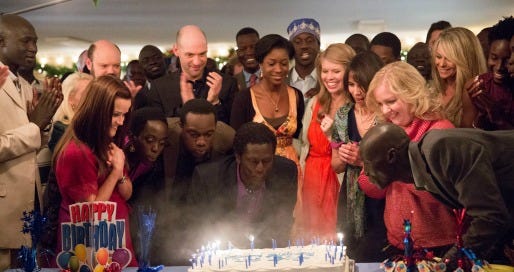The Good Lie

I admit I was cringing when I went in to see “The Good Lie,” the based-on-truth story of the Lost Boys of Sudan — refugees of war, thousands of whom eventually made their way to the U.S. and built something positive out of the ashes of their orphanhood.
I was leery not because of its touchy subject matter, but because Hollywood movies about people of color so often employ a white protagonist to make the troubles of the subjects seem “relatable,” or whatever ridiculous reason they provide. Even good, sincere efforts like “The Help” have relied upon this insidious crutch, and when I saw cutie Reese Witherspoon in the cast credits, I thought “Here we go …”
I’m happy to report that Witherspoon, while a key part of the story, is a supporting character and the focus remains squarely on the African actors, most of whom are actually Sudanese. She doesn’t even show up until a half-hour into the movie, acts as the boys’ guide in finding jobs and settling into America, then cedes into the background where she belongs.
Director Philippe Falardeau’s last movie, the wonderful “Monsieur Lazhar,” was nominated for the Oscar for Best Foreign Film, and TV veteran Margaret Nagle supplies the screenplay. The final result is heartfelt, occasionally dipping a toe into maudlin, but also surprisingly funny and wise.
The first part is the best and most harrowing, as we watch a group of Sudanese children escape the destruction of their village and the death of all of their parents. (Only a few are actually siblings, but they refer to each other as “brothers” and “sisters.”) They must trek 1,000 miles on foot to Kenya, more of their number dying along the way, just so they can become ensconced in a massive refugee camp.
At first we think this will be the story of Theo (a terrific Okwar Jale), the eldest child who, by rite of all the adults of the tribe being killed, is made Chief and leader. He is patient and kind, pushing the little ones to great lengths on their perilous journey but also serving as their unwavering protector. There’s an incredible moment where Theo holds a piece of glass, the group’s only real tool, under the noses of his sleeping charges to see if they still draw breath.
But circumstances change and impetuous Mamere (Peterdeng Mongok) becomes chief. They eventually make it to Kenya and, after growing to adulthood, are selected for a church program that sends lost boys (and girls) to America. Though they are separated from their beloved sister Abital (Kuoth Wiel), the three resolve to start new lives in Kansas City.
The middle part of the movie is largely a fish-out-of-water story, as young men who literally grew up fighting off lions must take on the First World challenges of telephones, buses and crabby bosses. Mamere (now played by Arnold Oceng), dreams of becoming a doctor and feels guilt over his actions regarding Theo.
The other two are Jeremiah (Ger Duany), tall and soulful, and Paul (Emmanuel Jal), a mechanical whiz who is prone to impetuousness and despair. Mamere, still acting as chief, tries to keep his little tribe from splintering further.
Witherspoon plays Carrie, a young-ish woman with a messy life and messier house, who helps the lost boys get jobs but keeps finding herself circling back to offer a hand and, eventually, friendship.
There’s a point late in “The Good Lie” where someone must fly back to Kenya and navigate the nightmarish diplomatic bureaucracy in order to right a great wrong. In a lesser movie it would be the perky blonde heroine who has taken up the cause of the helpless Africans. Here, the Sudanese make their own choices.
4 Yaps



